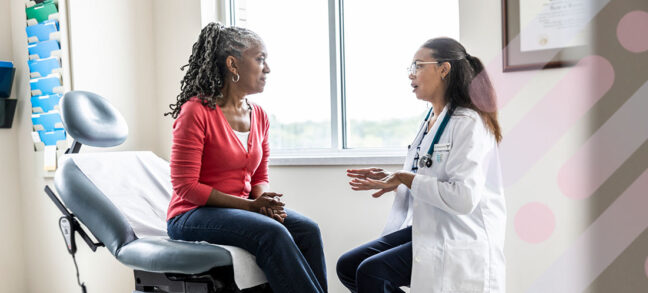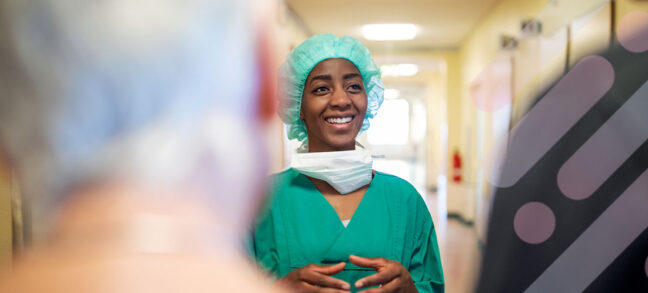Everyone’s breast cancer experience is unique—it’s why you’re your own best advocate. And why you want to assemble a care team that’s committed to doing what’s best for your individual needs and goals. Understanding what each person’s roles and responsibilities are can help you feel more secure and engaged in shared decision-making with your treatment team.
OB-GYN or primary care physician
Your obstetrician-gynecologist (OB-GYN) or primary care physician can be an M.D. or D.O. and specialize in family medicine or internal medicine. They play a major role in your breast cancer treatment and help manage your overall health and well-being during treatment and beyond.
how they can help
- They can refer you to additional doctors or specialists to further determine your treatment plan, including providing a referral for a mammogram or other breast imaging, complete a physical examination, or order bloodwork or other diagnostics.
- They can treat chronic conditions you may have had before your cancer diagnosis, help manage conditions associated with cancer treatment and continue to be your health contact once treatment is complete.
radiologist
Your radiologist will perform your mammogram, ultrasounds and biopsies that will diagnose your breast cancer.
how they can help
They can facilitate the next steps involved in your treatment by communicating the test results and a medical report to other specialists, like your medical oncologist and breast surgeon.
medical oncologist
Your medical oncologist is a cancer specialist with a thorough understanding of your cancer and the best course of action to treat it, which may include surgery, chemotherapy or radiation therapy. If you do need radiation therapy, a radiation oncologist may also be part of your team.
how they can help
They typically manage your overall progress throughout treatment.
breast surgeon
Your breast surgeon may be the one removing the cancer tumor(s) from your breast(s) or may be a general surgeon experienced in treating patients with breast cancer. They perform your mastectomy or partial mastectomy—also called a lumpectomy.
Consider choosing a breast surgeon who belongs to the American Society of Breast Surgeons. Some breast surgeons may have completed a fellowship in breast surgery or oncology, but breast fellowships are relatively new.
how they can help
They coordinate closely with your medical oncologist and plastic reconstructive surgeon.
additional team members
A number of other specialists may interact with and help you along the way:
- Genetic counselors can advise you on how your family history may influence your breast cancer risk, or explain your breast cancer gene (BRCA) test results. Read our blog post about genetic testing.
- Nurses, nurse practitioners and oncology nurse specialists will be a regular part of your care and will usually be who you interact with most on a day-to-day basis.
- Pathologists evaluate your cells and tissue samples to determine the stage and type of cancer you have.
- Physical therapists help you regain range of motion and strength after cancer treatment or surgery.
- Psychologists or psychiatrists are available to help if you are experiencing depression, stress, anxiety or grief.
- Oncology social workers assist with the emotional, social and financial impacts of cancer diagnosis, and can provide tips and connections to community resources.
engaging a Resensation®-trained plastic surgeon
Having breast reconstruction surgery is a highly personal choice. If you do choose to have reconstructive surgery, you may want to consider a plastic surgeon trained in the Resensation technique.
how they can help
Plastic surgeons trained in the Resensation technique have expertise in microsurgery. They reconnect the nerves in your chest with the nerves in your newly reconstructed breast using a donated nerve allograft to bridge the gap. It’s a technique that may restore sensation in your newly reconstructed breast.
Resensation Blog

How does mastectomy impact the nerves in the breast?
One sometimes overlooked aspect of mastectomy is its impact on nerves. Read what happens to nerves during mastectomy and explore…
Read More
What happens during implant breast reconstruction with Resensation®?
By repairing sensory nerves, Resensation® enables you to potentially regain sensation to your chest. Read how this procedure works during…
Read More
how resensation® helped Leanna feel secure in her family’s future
With Resensation®, Leanna can be there to watch her kids grow up—without losing the feeling of being whole.
Read More
sensory retraining: what is it, and how can it help me after resensation®?
Sensory retraining is a series of exercises designed to help you reconnect with your body after breast reconstruction with Resensation®.
Read More